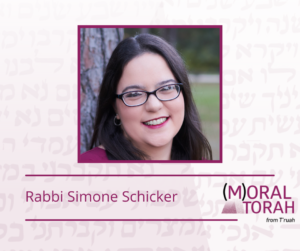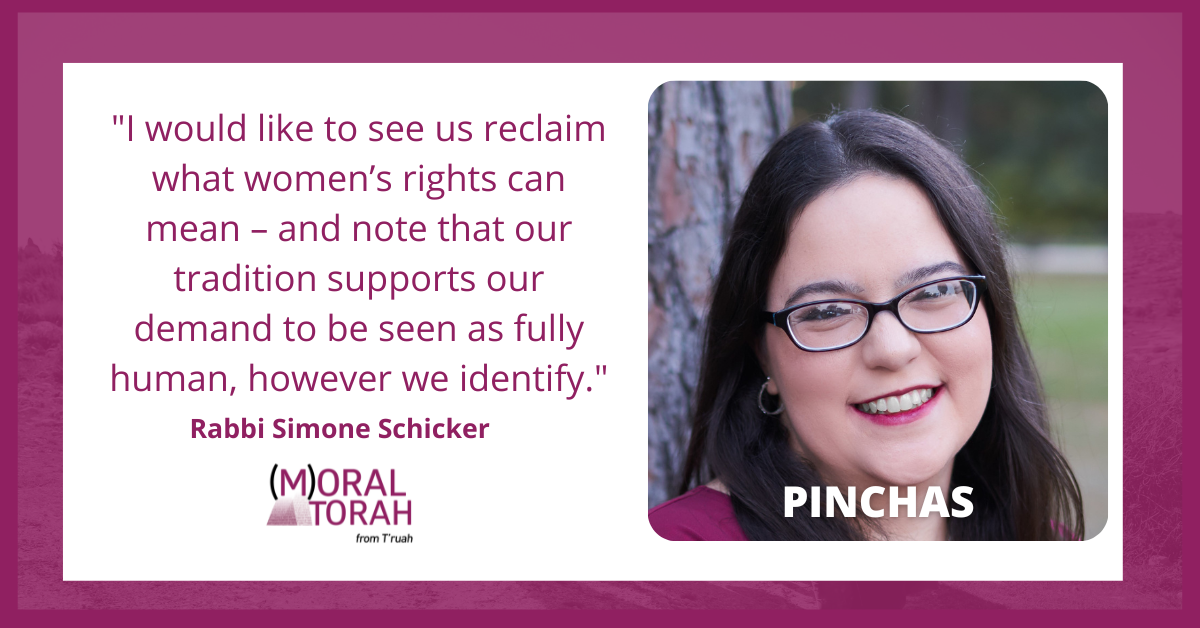A D’var Torah for Parshat Pinchas by Rabbi Simone Schicker
On the fridge in our kitchen in my childhood home were a million different magnets, stickers, and photographs. One of the stickers was for Planned Parenthood. I can still remember my mom saying, when I was in high school in the late ‘00s, “Didn’t we already march for these rights?”
Many of us and many of our relatives and friends, marched for years for our rights today – for what we call women’s rights. We also fought in the courts and with our lives. I view women’s rights as all-encompassing, by which I mean that I include all those who identify as women (whether cisgender or transgender), as well as those who identify as nonbinary and gender fluid. I give thanks to the Women’s Rabbinic Network (WRN) for helping me shape this idea. The WRN has just voted to officially welcome nonbinary and gender fluid rabbis into the umbrella of the WRN, recognizing that many such colleagues are already part of our membership. The WRN was created in 1975 by a group of female rabbinic students to provide the support and advocacy needed in the early years of women in the Reform rabbinate. This change in the WRN’s identity recognizes the need for a space for nonbinary and gender fluid rabbis as well as woman rabbis. The community WRN has built and is continuing to build is one of support, understanding, and vision – something the Jewish community has been striving towards for centuries.
Sign up to receive (M)oral Torah in your inbox each week.
The women of Parshat Pinchas are one of the earliest examples of striving to change the status quo in our history. They are women of vision, of understanding, and they are supportive of one another. Specifically I am thinking of Mahlah, Noa, Hoglah, Milcah, and Tirzah, the daughters of Zelophehad. They join together to approach the leadership, and they request a change of the law in order to allow them to inherit their father’s portion of land. Moses takes the request to God, and God responds by saying the law should be changed, not only for these women but for all time. God acknowledges the humanity of these women in a time when we believe women were seen as not as human as their male counterparts.
Today, we note that the term “women’s rights” can be divisive, as it has been used by TERFs (TERF is an acronym for trans-exclusionary radical feminist) to dismiss the womanness of transgender women. The argument goes that someone raised as a man cannot understand what it is to be a woman in our society. I vehemently disagree, and I give thanks to NCJW CEO Sheila Katz, who in her commencement speech at Ithaca College articulated that society has expected women to fulfill impossible roles – “how to look, how to act, how to talk, how to exist.” Anyone who identifies as a woman has to deal with these unreasonable expectations. I would like to see us reclaim what women’s rights can mean – and note that our tradition supports our demand to be seen as fully human, however we identify.
Find more commentaries on Parshat Pinchas.
Our tradition speaks to each of us both as individuals and as a collective when we are told that we were made in God’s image (Genesis 1:27). I recently read that this passage is viewed by some Christians as the basis for believing that one’s gender orientation has to match the anatomy one was born with, because if God created them male and female then it is understood that there is nothing else (Beyond a Binary God: A Theology for Trans* Allies by Tara K. Soughers). This is surprising to me considering God made “light and dark” as well as the “water and dry land,” and we know there are in-betweens of those things. Twilight, dawn, dusk, swamps, and rainforests come to mind. For, reading Genesis 1 as a Jew, I have always known that the Midrash expands this text in a powerfully meaningful way. In Bereshit Rabbah 8:1 we read:
Said R. Yirmiyah ben Elazar: In the hour when the Holy One created the first human, the Holy One created him [as] an androgyne [androginos], as it is said, ‘Male and female [God] created them.’
Our tradition sees the first creation story as one of a single being that encompassed all that humanity could be – we are each made in the Divine image because we each hold a piece of God within us.
 Zelophehad’s daughters make clear in their argument that their desire is to remain connected to community and family, as they state “Let not our father’s name be lost to his clan just because he had no son! Give us a holding among our father’s kinsmen!” (Numbers 27:4) So too do all of us want to be fully participatory members of our community – both large and small. We want to be able to bring our whole selves to Jewish spaces as well as other kinds of spaces. We are not singular identities but rainbows of experience.
Zelophehad’s daughters make clear in their argument that their desire is to remain connected to community and family, as they state “Let not our father’s name be lost to his clan just because he had no son! Give us a holding among our father’s kinsmen!” (Numbers 27:4) So too do all of us want to be fully participatory members of our community – both large and small. We want to be able to bring our whole selves to Jewish spaces as well as other kinds of spaces. We are not singular identities but rainbows of experience.
Rabbi Simone Schicker (she/her) was ordained from the Cincinnati campus of Hebrew Union College in 2018. She serves as the spiritual leader of Temple B’nai Israel in Kalamazoo, Michigan. She can be found on twitter @RavRainbow


